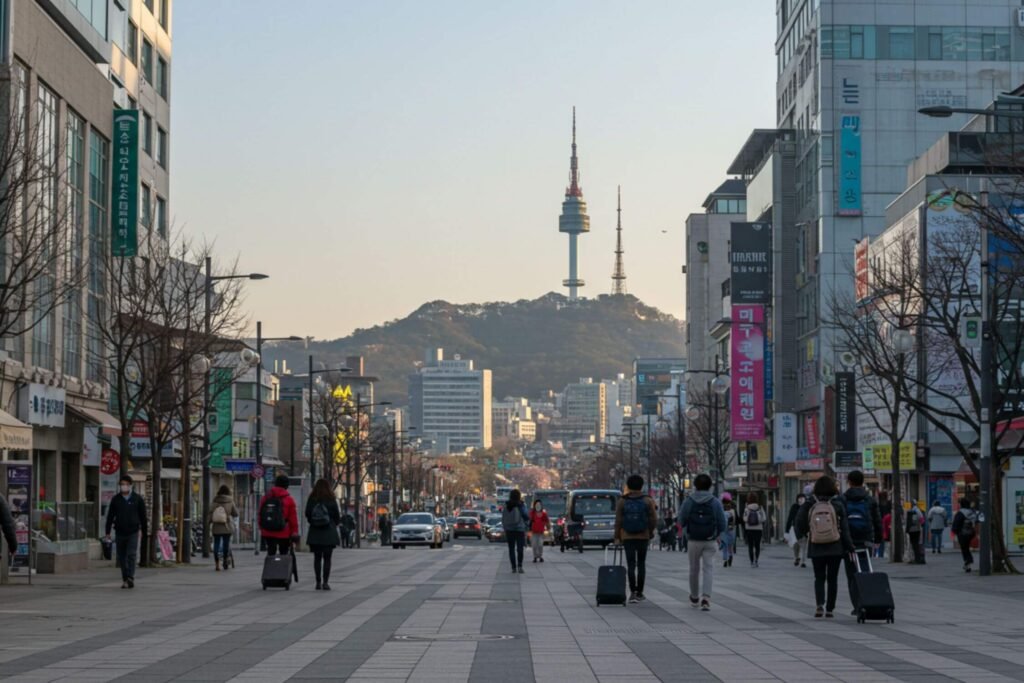Moving to a new country is always an exciting adventure, filled with anticipation, challenges, and endless possibilities. South Korea, with its vibrant culture, booming economy, and rich history, has become a popular destination for expats and digital nomads alike. If you’re planning to move to South Korea in 2025, there are a few essential things you should know to prepare yourself for a smooth transition. From cultural nuances to everyday practicalities, this guide will help you navigate your move with confidence.
1. Understanding the language barrier and learning Korean
One of the most significant challenges for foreigners moving to South Korea is the language barrier. While English is commonly taught in schools and widely spoken in business and tourism sectors, daily life in Korea is predominantly conducted in Korean. Knowing basic Korean phrases can greatly improve your experience, whether you’re ordering food, asking for directions, or interacting with neighbors.
In 2025, the Korean language continues to evolve, with more language learning apps and online resources available than ever before. Investing time in learning Hangul (the Korean alphabet) before your move will make everyday tasks more manageable and open doors to deeper cultural understanding. Many expats also find that joining local language exchange groups or attending Korean classes helps build connections and improves fluency quickly.
2. Visa requirements and legal regulations
Before packing your bags, it’s crucial to understand South Korea’s visa regulations, which can be complex depending on your nationality and purpose of stay. Whether you plan to work, study, or live as a dependent, the visa application process requires careful preparation.
In 2025, South Korea has streamlined some of its visa policies to attract more skilled professionals and international students. The most common visas for foreigners include the E-2 visa for English teachers, the D-2 student visa, and the F-series visas for long-term residents. It’s advisable to consult the official Korean immigration website or a visa specialist to ensure you meet all the requirements. Keep in mind that visa processing times can vary, so starting early is key.
3. Cost of living and budgeting wisely
South Korea’s cost of living varies significantly between cities and regions. Seoul, the capital, is known for its fast-paced lifestyle and higher expenses, especially in terms of housing. In contrast, smaller cities like Busan or Daegu offer more affordable options but fewer international conveniences.
Rent is often the biggest monthly expense, and in 2025, apartment prices in Seoul remain relatively high, especially for well-located studios or one-bedroom units. Many foreigners opt for shared housing or officetels (studio apartments) to reduce costs. Aside from rent, food, transportation, and utilities are reasonably priced compared to other major global cities, but dining out frequently can add up.
Budgeting for your move should also include initial setup costs such as deposits for apartments (known as jeonse or monthly rent with a lump-sum deposit), buying household items, and transportation cards. Having a financial buffer will ease the transition, especially during your first few months.
4. Healthcare system and health insurance
South Korea boasts one of the world’s most efficient and affordable healthcare systems. Expats living in Korea are required to enroll in the National Health Insurance (NHI) system, which covers a broad range of medical services at low out-of-pocket costs.
Medical facilities in Korea are modern and staffed by highly trained professionals, with Seoul having several internationally recognized hospitals. In 2025, telemedicine services have expanded, allowing foreigners to consult doctors remotely, which is a big plus for busy expats.
It’s important to note that not all clinics or hospitals have English-speaking staff, so having a Korean-speaking friend or interpreter can be helpful during medical visits. Also, consider supplementary private health insurance if you want coverage for services not included in NHI, like certain cosmetic procedures or dental care.
5. Culture and social etiquette
South Korea’s culture is deeply rooted in Confucian values such as respect for elders, hierarchy, and community harmony. Understanding these cultural nuances will not only help you avoid awkward situations but also enable you to build stronger relationships with locals.
Politeness and humility are highly valued, and simple gestures like bowing when greeting or addressing people with appropriate honorifics show respect. Public behavior is generally more reserved than in Western countries, and speaking loudly or showing strong emotions in public may be frowned upon.
2025 has seen more awareness and acceptance of cultural diversity, especially in urban areas, but learning and adapting to social etiquette remains essential for any expat. Participating in traditional holidays and festivals, like Chuseok (Korean Thanksgiving) or Seollal (Lunar New Year), is a great way to immerse yourself in the culture and connect with locals.
6. Efficient and convenient public transportation
One of South Korea’s standout features is its world-class public transportation system. The subway networks in Seoul, Busan, and other major cities are punctual, clean, and extensive, making it easy to get around without a car.
In 2025, transportation cards such as T-money or Cashbee continue to be the most convenient way to pay for buses, subways, and even taxis. These cards can be purchased at convenience stores or subway stations and topped up with ease.
For longer-distance travel, Korea’s high-speed KTX trains connect major cities in a matter of hours, while affordable buses and flights serve regional destinations. Owning a car is generally unnecessary unless you plan to live outside urban centers.
7. Food and dining culture
South Korean cuisine is rich, diverse, and often spicy. As an expat, you’ll find a wide variety of food options ranging from traditional dishes like kimchi, bibimbap, and bulgogi to international cuisines in metropolitan areas.
Eating out is affordable and convenient, with countless street food stalls, casual eateries, and upscale restaurants. In 2025, the food delivery culture remains incredibly popular, with apps like Baedal Minjok and Yogiyo offering a wide selection of options delivered quickly to your door.
Trying local food can be a delightful adventure, but be prepared for unfamiliar ingredients and spicy flavors. If you have dietary restrictions or allergies, learning how to communicate them in Korean is useful.
8. Housing and accommodation trends
The housing market in South Korea continues to evolve, especially in big cities. The traditional jeonse system, where tenants pay a large deposit instead of monthly rent, still exists but is less common in 2025 due to changing financial dynamics.
Most foreigners prefer monthly rent apartments with smaller deposits. Modern officetels with built-in amenities are popular among single expats and young professionals.
When searching for housing, be aware that many landlords prefer tenants who can stay long-term and often require a guarantor or proof of stable income. Working with a reliable real estate agent who understands expat needs is highly recommended.
9. Work culture and professional environment
South Korea is known for its hardworking and hierarchical work culture. Punctuality, dedication, and respect for seniority are highly emphasized in most workplaces. However, changes are underway in 2025, with younger generations and companies promoting better work-life balance and flexible working arrangements.
If you’re coming as an English teacher, IT professional, or in any other industry, understanding the local work culture will help you succeed. Business meetings often begin with formal greetings, and group harmony is valued over individual opinions.
Networking and relationship-building are also crucial, so engaging in after-work social activities like dinners or karaoke sessions (called hoesik) can help you integrate with colleagues.
10. Safety and quality of life
South Korea is generally considered one of the safest countries in the world, with low crime rates and a strong sense of community vigilance. Expats often feel secure walking around cities, even at night.
The country also offers a high quality of life with excellent infrastructure, clean public spaces, and numerous recreational options. From hiking in national parks to enjoying K-pop concerts and modern shopping districts, South Korea has something for everyone.
That said, being aware of natural phenomena like occasional typhoons or winter snowstorms can help you prepare accordingly. Emergency services are efficient, and many public areas provide clear signage and instructions for safety.
Bottom line
Moving to South Korea in 2025 can be a life-changing experience, filled with opportunities for personal and professional growth. By understanding these ten important aspects—from language and visa requirements to culture and daily life—you’ll be better equipped to adapt and thrive in your new home.
Preparing ahead, embracing the local customs, and keeping an open mind will help you make the most out of your exciting journey to South Korea. Whether you’re moving for work, study, or adventure, this dynamic country welcomes you with open arms and countless possibilities.



